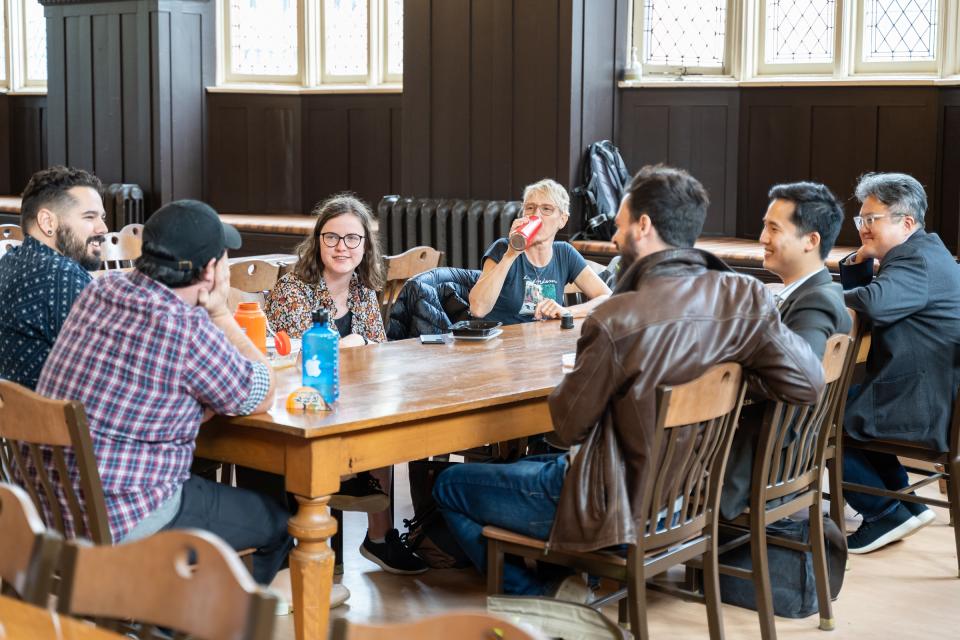Now that the pandemic is behind us, I’m now something of an exception – that is, I am someone who still spends more days away from Wycliffe than in college. However, at a time when so much these days is advanced and effected by email and virtual communication, I’ve also become aware of the value of the college community. For “being together in the body,” as Paul once called it in a slightly clumsy way, fosters mutual trust and common cause, moderates misunderstandings, and gives context to what people mean when they speak (body language included). Somewhere (maybe it’s in The Four Loves) C. S. Lewis talks about his experience of getting to know an aspect of J. R. R. Tolkien that only came to light when the latter was in the company of Charles Williams. That perception wouldn’t have been possible had the three of them been in adjoining Zoom™ windows rather than in the back room of the now-famous Eagle and Child. What’s more, bringing “common worship” into the equation allows us relate to people even as they pray, adding still another dimension. The old (clichéd) adage about “those who pray together stay together” is often used about families, but there’s a sense in which it applies to family in its wider meaning, such as a college community. The sacrament and the “sacramentals” of communal meals offer a centripetal pull towards community, even as so many other things are pushing centrifugally. From my experiences last semester, people at these meals want to talk about themselves and learn more about the others around them, instead of simply gossiping about those absent, or pushing their opinions, or striving to persuade and “do business.” The atmosphere is upbeat, yes, but also sensitive. I’ve often thought it must be quite a blessing to reach an evening class immediately following the Eucharist and the Meal, supercharged by the experience.
When it comes to those who join class online, whether from Prince Edward Island or Prince Rupert Land, I do believe that these too benefit from remote participation with a group in the physical classroom room – provided the session is chaired well. On occasion I myself have logged on remotely to seminars where others have assembled in person; in these cases, despite their obvious limitations and occasional frustrations, I have nevertheless benefitted from these gatherings more than when everyone is far apart, listening to a voice and watching a single face on the screen. One may be outside looking in, but there is at least some real presence on offer.
In a city like Toronto – and at Wycliffe, as a kind of microcosm – there is usually something going on. These events brings with them the freedom to join in or to stay away: to sit in our room or to do something else in the big city, or to begin to explore it. It’s good when teaching faculty get to know churches and other parts of the city and can so draw on a wider range of wisdom and awareness of pastoral issues, but it’s also good to have the institutional hub and the collegial fellowship of a community like Wycliffe to help collate and process such experiences. Theological education should help one to reflect on and interpret a growing faith, a sense of vocation, and a dawning awareness of the very real pastoral challenges around us. It seeks to help each of us to construct the resources we and others will need in days to come by acquiring theologically literacy and developing the skills, intelligence, and wisdom necessary for faithful ministry planning and organisational communication – and for equipping others to do the same. Moreover, we are not to neglect to discern the spirits – i.e., we should surf the waves, rather than being dragged out to sea – and so although it might sound quaintly old fashioned, we need to keep reading scripture, even if there’s a place for the spiritual classics as well.
As we exercise and train to exercise our ministries better, we are not so much called to pursue excellence according to some standard imposed from without, but to make the most of each opportunity, as the Lord leads. Yet direction – personal, spiritual, intellectual – given by those who have not only experienced, but also thought these things through ahead us remains important, since we trust those whom we feel to know and care for us. These will be people with a minimum of guile and agenda, who facilitate our freedom from superficial allegiances and goals and so show love and blessing, just as the desert saints sought apatheia as a path to compassion. So often we need to lower our expectations, forgive more than we are inclined to, and manage our anxieties – which, in case of ordinands, can be double – especially the pressures of passing coursework and finding that first job. In other words, rather than laying down laws and imperatives – a list of “shoulds” intended for any “followers” paying attention – Christian witness to the Gospel speaks always in the indicative mood, as is meet and right.





